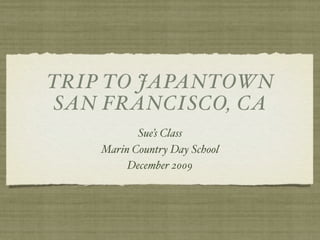San Francisco's Japantown
- 1. TRIP TO JAPANTOWN SAN FRANCISCO, CA SueŌĆÖs Class Marin Country Day School December 2009
- 2. HISTORY
- 3. This is the Peace Fountain in the middle of Japantown. ItŌĆÖs supposed to look like a lotus ’¼éower. Hailey
- 4. This is a bridge we found in Japantown. It is a pedestrian bridge that connects !om one side of a street to the other. Under the bridge there is a fan you wi# see on the next slide. ~Amelia
- 5. This is a plaque of a fan. It is in the center of the road and rea#y colorful. It is supposed to represent Japanese Americans being !eed !om interment camps. ~Emma
- 6. This is a plaque !om Japantown. It talks about internment camps. Internment camps were camps that the Americans put the Japanese Americans in during World War II. ~Alec
- 7. This is a sign about the internment camps. Internment camps were where the Americans kept people that were Japanese during World War II. When the Japanese were at the camps they had to sleep in barracks. Henry
- 8. A&er World War Two the United States became !iends with Japan. This plaque is about when they became !iends. ~Luc
- 9. This is a church for Chinese/Japanese people and disabled people. There was a person that said the prayers and a person that translated it into sign language. Tess S-K
- 10. This is a plaque about sports like baseba#. It is a part of a tour they have in Japantown. Max P.
- 11. RESTAURANTS AND FOOD
- 12. This is a picture of Benihana, a famous Japanese restaurant in Japantown. They are very famous for their food and tables. Their tables have stoves on top so that people can watch their food cooking. They also do tricks with the food. They throw shrimp into their hats and pockets. ~Lulu
- 13. This is a picture of a menu !om a Japanese restaurant. Fish is one of the common foods in Japan because Japan is a country made up of many islands surrounded by water. ~Max B.
- 14. This is a market in Japantown. There are a lot of aisles and di’¼Ćerent kinds of Japanese foods. Claire
- 15. This is a picture of ’¼üsh we saw at the Japantown market. We also saw octopus and crab. Lily
- 16. These are vegetables we found in a store. Most of the food was the food that I usua#y buy !om Safeway, but I have never seen Gobo before in my life. It is some kind of a vegetable. ~Sydney
- 17. This is some of the food at Japantown. There is mochi on the top shelf. George
- 18. This is in a store in Japantown.We saw two markets. These are mochi. Some are ’¼ü#ed with sweet bean paste. Alexander
- 19. TEA CEREMONY
- 20. This is part of a tea garden in Japantown. It is the outside of the building where we had a Tea Ceremony. We sat down and the people inside served us tea. They gave us little cookies with the tea. ~Alan
- 21. This is a shrine in the same tea garden. ~Sarena
- 22. This is a car the color of the tea we drank at the Tea Ceremony in Japantown! Tess M.






















